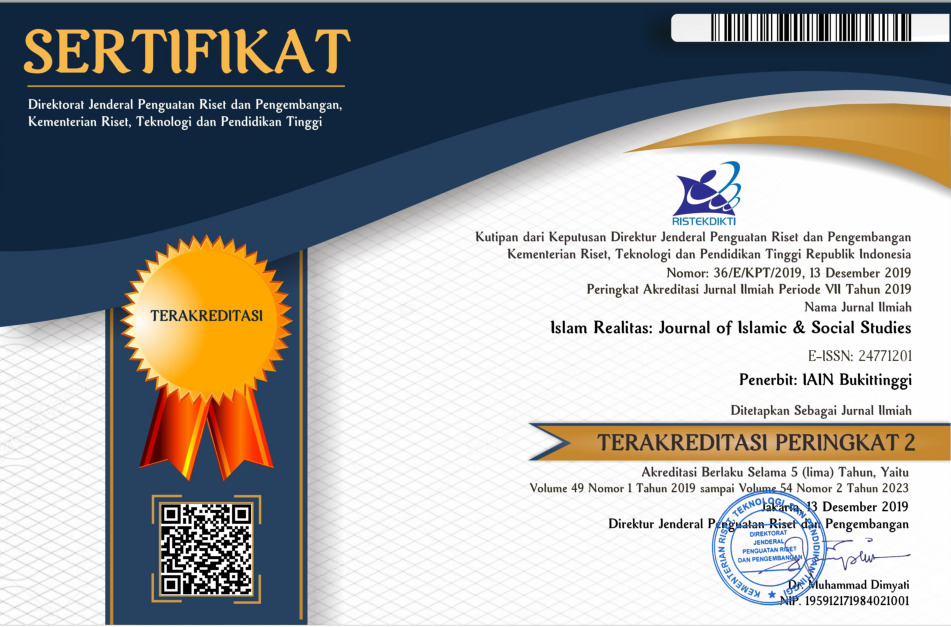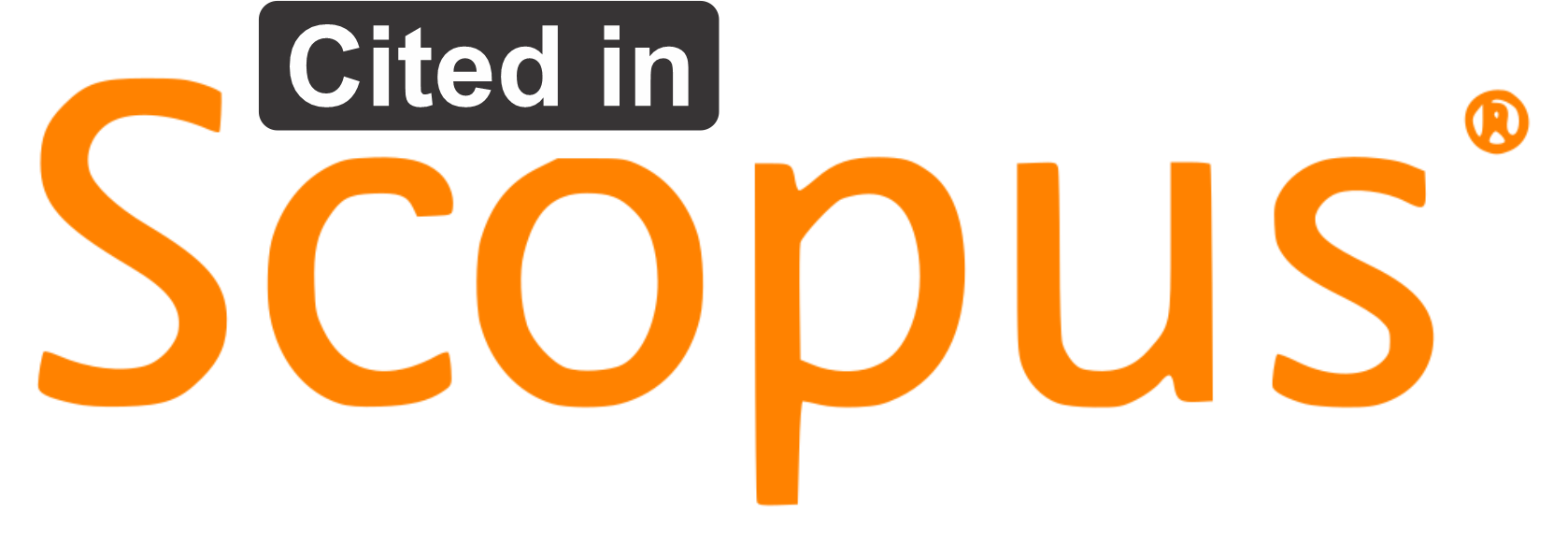Developing ˜Islam and Religious Moderation Course Based on Kampus Merdeka in Islamic Higher Education
Downloads
The focus of the research is the development of the subject "Islam and Religious Moderation" in Islamic Education study program at IAIN Kerinci and learning tools, namely Rencana Pembelajaran Semester (RPS, Semester Learning Plan) and course syllabus. In conducting the research, the research and development (R&D) approach is used as a basic reference for developing lecture programs through observation or survey methods, trials and classroom actions. From the results and research analysis, it can be concluded that in the development of a course there are several things that must become the product of development including the course structure, RPS, syllabus, and course-teaching materials of course. In terms of the development of the Islamic and Religious Moderation course based on the Merdeka Belajar – Kampus Merdeka (MBKM, Independent learning – Independent campus) program, theoretical and practical analysis of the guidelines, instructions, and implementation of religious moderation and MBKM is needed. The product development courses are further refined through validation by curriculum and religious education experts and theoretical validation through journal articles of international repute as comparisons.
Books
Arikunto, S. ‘Prosedur penelitian: Suatu pendekatan praktis,’ Jakarta: Rineka Cipta, 2003.
Borg, W. R., & Gall, M. D., ‘Educational research: An introduction,’ The Eight Edition. New York: Longman. Inc, 2007.
Turnbull, Joanna, Diana Lea, D Parkinson, P Phillips, B Francis, S Webb, and others, ‘Oxford Advanced Learner’s Dictionary’, International Student’s Edition, 2010.
Dekmejian, R Hrair, Islam in Revolution: Fundamentalism in the Arab World (Syracuse University Press, 1995).
Direktorat Jenderal Pendidikan Tinggi, Kemendikbud, ‘Buku Panduan Merdeka Belajar – Kampus Merdeka,’ Jakarta: Kementerian Pendidikan dan Kebudayaan, 2020.
Ismail, A., ‘Prahara yangTerselubung’ Yogyakarta: Trusmedia Grafika, 2017.
Kemenag, ‘Rencana Strategis Kementerian Agama Tahun 2020 – 2024,’ Jakarta: Kementerian Agama RI, 2020.
Kemendikbud, ‘Permendikbud No. 3 Tahun 2020 tentang Standar Nasional Pendidikan Tinggi,’ Jakarta: Kementerian Pendidikan dan Kebudayaan, 2020.
Kemendikbud, ‘Undang-Undang RI No 12 Tahun 2012 Tentang Pendidikan Tinggi,’ 2012, http://sipuu.setkab.go.id/PUUdoc/17624/UU0122012_Full.pdf
Misrawi, Z., ‘HadratussyaikhHasyim Asy‟ari Moderasi Keislamandan Kebangsaan,’ Jakarta: KompasMedia Publisher, 2010.
Tim Balitbang Kemenag RI., ‘Moderasi Beragama,’ Jakarta: Badan Litbang dan Diklat Kementerian Agama RI, 2019.
Journals
Abror Mhd., ‘Moderasi Beragama Dalam Bingkai Toleransi ( Kajian Islam Dan Keberagaman )’, Rusydiah, 1.1 (2020), 137–48
Akhmadi, Agus, ‘Moderasi Beragama Dalam Keragaman Indonesia Religious Moderation in Indonesia ’ S Diversity’, Jurnal Diklat Keagamaan, 13.2 (2019), 45–55
Al-Qardhawi, Yusuf, ‘Kalimat Fi Al-Wasatiyyah Al-Islamiyyah Wa Ma „alimuha’, Mesir Kairo: Cairo: Dar As-Syuruq, 2008
Alashwal, May, ‘Curriculum Development Based on Online and Face-to-Face Learning in a Saudi Arabian University’, Journal of Curriculum and Teaching, 9.3 (2020), 141 <https://doi.org/10.5430/jct.v9n3p141>
Ali, Nuraliah, ‘Measuring Religious Moderation Among Muslim Students at Public Colleges in Kalimantan Facing Disruption Era’, INFERENSI: Jurnal Penelitian Sosial Keagamaan, 14.1 (2020), 1–24 <https://doi.org/10.18326/infsl3.v14i1.1-24>
Amalia, Taranindya Zulhi, ‘Evaluasi Kurikulum STAIN Kudus (Studi Analisis Struktur Mata Kuliah: Linguistik)’, STAIN Kudus, 3.1 (2015), 16–38
Andrian, Dedek, Badrun Kartowagiran, and Samsul Hadi, ‘The Instrument Development to Evaluate Local Curriculum in Indonesia’, International Journal of Instruction, 11.4 (2018), 921–34 <https://doi.org/10.12973/iji.2018.11458a>
Arif, Syaiful, ‘Moderasi Beragama Dalam Diskursus Negara Islam: Pemikiran KH Abdurrahman Wahid’, Jurnal Bimas Islam, 13.1 (2020), 73–104 <https://doi.org/10.37302/jbi.v13i1.189>
Arifinsyah, Arifinsyah, Safria Andy, and Agusman Damanik, ‘The Urgency of Religious Moderation in Preventing Radicalism in Indonesia’, ESENSIA: Jurnal Ilmu-Ilmu Ushuluddin, 21.1 SE-Articles (2020), 91–108 <https://doi.org/10.14421/esensia.v21i1.2199>
Ayu Dessy Sugiharni, Gusti, ‘Pengujian Validitas Konten Media Pembelajaran Interaktif Berorientasi Model Creative Problem Solving’, Jurnal Penelitian Dan Pengembangan Pendidikan, 2.2 (2018), 88–95
Brown, Hilary, ‘Action Research in the Classroom: A Process That Feeds the Spirit of the Adolescent’, International Journal of Qualitative Methods, 3.1 (2004), 25–41 <https://doi.org/10.1177/160940690400300103>
Dekmejian, R Hrair, Islam in Revolution: Fundamentalism in the Arab World (Syracuse University Press, 1995)
Gall, M D, J P Gall, and W R Borg, Educational Research: An Introduction (Pearson/Allyn & Bacon, 2007)
Haris, S A, M Muqowim, and R Radjasa, ‘The Contextualization Of Sayyid Idrus Bin Salim Al-Jufri’s Thoughts On Religious Moderation In Institut Pendidikan Al-Khairaat Palu’, Progresiva: Jurnal Pemikiran Dan Pendidikan Islam, 9.2 (2020), 77–93 <https://doi.org/10.22219/progresiva.v10i2.12599>
Hasan, K, ‘Relationship of Professionalism With Religious Moderation In Islamic Religious Education Teachers’, At-Tarbiyat: Jurnal Pendidikan Islam, 3.2 (2020), 119–30
Ibrahim, Haslina, ‘The Principle of Wasaá¹iyyah (Moderation) and the Social Concept of Islam: Countering Extremism in Religion’, Al-Itqan, 1.November (2018), 39–48
Islam, Tazul, and Amina Khatun, ‘“Islamic Moderation†in Perspectives: A Comparison Between Oriental and Occidental Scholarships’, International Journal of Nusantara Islam, 3.2 (2015), 69–78 <https://doi.org/10.15575/ijni.v3i2.1414>
Kementerian Agama RI, ‘Rencana Strategis Kementerian Agama Tahun 2020-2024’, Menteri Agama Republik Indonesia, 2020, 1–309
Misrawi, Zuhairi, Hadratussyaikh Hasyim Asy’ari: Moderasi, Keumatan, Dan Kebangsaan (Penerbit Buku Kompas, 2010)
Mohd Shukri Hanafi, ‘The Wasatiyyah (Moderation) Concept in Islamic Epistemology: A Case Study of Its Implementation in Malaysia’, International Journal of Humanities and Social Science, 4.9(1) (2014), 51–62
Muqtada, Muhammad Rikza, ‘The Teaching Of Religious Moderation In The Arba’in Hadith Of Mahfuzh Al-Tarmasi and The Arba’in Hadith Of Hasyim Ash’ari’, Jurnal Ushuluddin, 27.2 (2019), 121 <https://doi.org/10.24014/jush.v27i2.6728>
Nasaruddin, HM Tauchid Noor, Budhy Prianto, and Tommy Hariyanto, ‘Social Behavior in Religious Moderation(Study of Social Reality of Communities in Tohpati and Taliwang in Cakranegara Utara Village, Cakranegara District, Indonesia)’, International Journal of Advances in Scientific Research and Engineering, 06.09 (2020), 62–71 <https://doi.org/10.31695/ijasre.2020.33882>
Pine, Gerald, ‘Teacher Action Research: Building Knowledge Democracies’ (Thousand Oaks, California, 2009) <https://doi.org/10.4135/9781452275079>
Priatmoko, Sigit, and Nilna Iqbal Dzakiyyah, ‘Relevansi Kampus Merdeka Terhadap Kompetensi Guru Era 4.0 Dalam Perspektif Experiential Learning Theory’, At-Thullab : Jurnal Pendidikan Guru Madrasah Ibtidaiyah, 4.1 (2020), 1 <https://doi.org/10.30736/atl.v4i1.120>
Puadi, Hairul, ‘Islam Moderat Dalam Konteks Sosial Politik Di Indonesia’, Dalam Jurnal Pusaka, Edisi Juli-Desember, 2014, 6–7
Ropi, Ismatu, ‘Whither Religious Moderation? The State and Management of Religious Affairs in Contemporary Indonesia’, Studia Islamika, 26.3 (2019), 597–601 <https://doi.org/10.36712/sdi.v26i3.14055>
Saifuddin, Lukman Hakim, Moderasi Beragama, ed. by Jakarta, Cet 1 (Badan Litbang dan Diklat Kementrian RI, 2019)
Serrano RodrÃguez, RocÃo, MarÃa Isabel Amor Almedina, Ãngel Guzman Cedeño, and José Guerrero-Casado, ‘Validation of an Instrument to Evaluate the Development of University Teaching Competences in Ecuador’, Journal of Hispanic Higher Education, 19.1 (2020), 19–36 <https://doi.org/10.1177/1538192718765076>
Sitepu, Bintang Petrus, and Ika Lestar, ‘Pelaksanaan Rencana Pembelajaran Semester Dalam Proses Pembelajaran Bintang Petrus Sitepu & 2 Ika Lestari Universitas Negeri Jakarta in Learning Process’, 32.1 (2017), 43–51
Syatar, Abdul, Muhammad Majdy Amiruddin, and Islamul Haq, ‘Religious Moderation Campaign Through Social Media At Multicultural Communities Fatmawati’, KURIOSITAS Media Komunikasi Sosial Dan Keagamaan, 12 (2020)
Thoriquttyas, Titis, Meidi Saputra, Imamul Huda, Yusuf Hanafi, and Nila Zaimatus, ‘Strengthening the Religious Moderation through Innovation of Islamic Religious Education (IRE) Based Civic Intelligence and the Values Clarification Technique (VCT)’, KnE Social Sciences, 2020 (2020), 219–27 <https://doi.org/10.18502/kss.v4i14.7878>
Tohir, Mohammad, ‘Buku Panduan Merdeka Belajar - Kampus Merdeka’, 2020 <https://doi.org/10.31219/osf.io/ujmte>
Turnbull, Joanna, Diana Lea, D Parkinson, P Phillips, B Francis, S Webb, and others, ‘Oxford Advanced Learner’s Dictionary’, International Student’s Edition, 2010
Zainal, Zainal, ‘Konsep Kampus Merdeka Belajar Dalam Menghadapi Era Revolusi Industri 4.0’, 2021, 73–80 <https://doi.org/10.26418/pipt.2021.20>
Zuhdi, Muhammad, ‘Challenging Moderate Muslims: Indonesia’s Muslim Schools in the Midst of Religious Conservatism’, Religions, 9.10 (2018), 310 <https://doi.org/10.3390/rel9100310>
Copyright (c) 2023 Ahmad Jamin, Heri Mudra

This work is licensed under a Creative Commons Attribution-ShareAlike 4.0 International License.
Authors who publish with this journal agree to the following terms:
- Authors retain copyright and grant the journal right of first publication with the work simultaneously licensed under a Creative Commons Attribution License that allows others to share the work with an acknowledgment of the work's authorship and initial publication in this journal.
- Authors are able to enter into separate, additional contractual arrangements for the non-exclusive distribution of the journal's published version of the work (e.g., post it to an institutional repository or publish it in a book), with an acknowledgment of its initial publication in this journal.
- Authors are permitted and encouraged to post their work online (e.g., in institutional repositories or on their website) prior to and during the submission process, as it can lead to productive exchanges, as well as earlier and greater citation of published work (See The Effect of Open Access).









